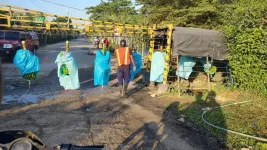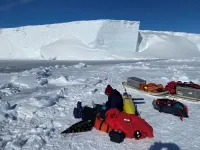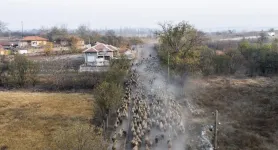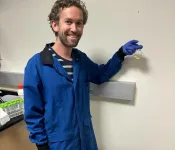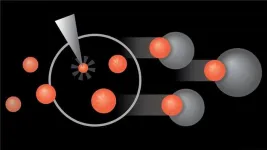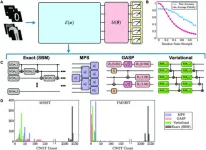(Press-News.org) A Michigan State University researcher’s new model for studying breast cancer could help scientists better understand why and where cancer metastasizes.
Professor https://directory.natsci.msu.edu/Directory/Profiles/Person/103559 who teaches in the MSU Department of Physiology, has been researching the E2F5 gene, of which little is known, and its role in the development of breast cancer. Based on findings from Andrechek’s lab, the loss of E2F5 results in altered regulation of Cyclin D1, a protein linked to metastatic breast tumors after long latency.
The study also demonstrates that the removal of E2F5 in the mammary gland leads to tumor formation. As scientists better understand how genes impact breast cancer, they could also learn why cancers metastasize and where cancers are likely to spread.
The research was published in one of the most recent issues of Oncogene, a leading cancer journal. Andrechek also received a two-year $300,000 American Cancer Society grant to support the next phase of his work.
In addition, the lead graduate student on the breast cancer metastasis research project, Jesus Garcia Lerena, won a fellowship through the Susan G. Komen ASPIRE grant program earlier this year. ASPIRE, or A Supplement to Promote Inclusion for Research Excellence, supports research trainees from historically underrepresented communities. Lerena, who is from Cuba, joined the Andrechek lab in 2022.
According to Andrechek, while a genetically engineered mouse model can be artificially tweaked through injection to force cancer cells to go to organs like the liver or brain, his lab’s newly generated mouse model makes that unnecessary.
“One of the reasons that we’re really excited about this model is that it does something that most genetically engineered mouse models have not done in the past,” Andrechek said. “It’s metastasizing and, when it spreads, it’s going to places that human breast cancer goes to. Most models of breast cancer go straight to the lungs, but that’s not where most human breast cancer goes. And so, we’re really excited about this model because it’s going to other places and making it more relevant to look at human cancer.”
According to Andrechek, breast cancer most often spreads to the lymph nodes, bones or liver.
Zeroing in on hundreds of genes
Andrechek’s lab uses bioinformatics (using computer technology to capture and interpret biological data) along with genetic models to examine the mechanisms involved in the development and progression of breast cancer. Its research centers on understanding mammary tumor development and uses several methods ranging from animal models to computational analysis of gene expression data.
For several years, Andrechek and his team have specifically zeroed in on the E2F family, a particular group of genes that control cell cycle progression. E2F5 is a transcription factor, which means that it regulates the expression — whether on or off — of many other genes.
Trying to pinpoint exactly which genes induce breast cancer and drive metastasis is what Andrechek’s lab will focus on during its next phase of research.
“We don’t think it’s E2F5 that is directly causing these effects,” Andrechek explained. “We think it’s some of the genes that it regulates that cause these effects. We’re seeing hundreds of genes. So, the part that gets tricky is to dissect out exactly which ones are causing the effects.”
From ‘knockout’ models to targeted therapies
For the research, the lab uses a laboratory mouse in which one or more genes have been turned off or “knocked out” to study the role of specific genes. Mice models are highly accurate, Andrechek said, because the same sort of mutations occur in mice as in human cancer.
While breast cancer can happen at any age, most women are in their 60s or 70s when they are first diagnosed with the disease. Andrechek’s research is physiologically relevant since it takes about two years for the mice in Andrechek’s study to develop a tumor, which means the mice are getting breast cancer at an equivalent age as women.
However, breast cancer is not just one disease. According to Andrechek, there are many different subtypes of breast cancer, depending on factors like whether the tumor is estrogen positive or negative, progesterone positive or negative, and various forms of gene expression.
Once scientists know the genetic programs that are off or on in a specific tumor, they can start to develop targeted therapies with fewer side effects.
“We are nowhere close with this model to developing a targeted therapy,” Andrechek said. “That is years down the road. But if we can start to understand the genetics behind this and find a similar subtype in humans, then we can start tailoring therapy. Because what we don’t want to do is just rely on traditional chemotherapy. The side effects that people suffer from are terrible. Understanding the genetics behind how a breast cancer is developing holds a lot of promise for developing therapies that are less toxic.”
By Lynn Waldsmith
END
MSU researcher develops promising new genetic breast cancer model
2024-11-08
ELSE PRESS RELEASES FROM THIS DATE:
McCombs announces 2024 Hall of Fame inductees and rising stars
2024-11-08
AUSTIN, Texas — Friends and distinguished alumni of the McCombs School of Business at The University of Texas at Austin inducted four alumni into the school’s Hall of Fame on Nov. 7 at the AT&T Hotel and Conference Center. This year’s honorees are Christopher Bake, BBA ’88; Ray Brimble, B.A. ’74; Bennett Glazer, BBA ’68; and Brien Smith, BBA ’79, MPA '81. McCombs Dean Lillian Mills also recognized 2024 Rising Stars Simeon Bochev, MSF ’13; Michael Ginnings, BBA ’09; and Gerardo Guardado, MBA ’10.
The ...
Stalling a disease that could annihilate banana production is a high-return investment in Colombia
2024-11-08
There’s no cure for a fungal disease that could potentially wipe out much of global banana production. Widespread adoption of cement paths, disinfection stations, and production strategies could net 3-4 USD of benefits for each dollar invested in Colombia.
Hundreds of millions of dollars in banana exports from Colombia are at risk due to a fungal disease best known as Tropical Race 4 (TR4). First detected in Asia in the 1990s, the Fusarium fungus that causes the disease arrived in Colombia in 2019, completing its inevitable global spread to South America, the last major banana production continent that remained TR4-free. Researchers are confident ...
Measurements from ‘lost’ Seaglider offer new insights into Antarctic ice melting
2024-11-08
New research reveals for the first time how a major Antarctic ice shelf has been subjected to increased melting by warming ocean waters over the last four decades.
Scientists from the University of East Anglia (UEA) say the study - the result of their autonomous Seaglider getting accidentally stuck underneath the Ross Ice Shelf - suggests this will likely only increase further as climate change drives continued ocean warming.
The glider, named Marlin, was deployed in December 2022 into the Ross Sea from the edge of the sea ice. Carrying a range of sensors to collect data on ocean processes that are important for climate, it was programmed to travel northward into ...
Grant to support new research to address alcohol-related partner violence among sexual minorities
2024-11-08
Navigating the intersection of alcohol use and intimate partner violence amongst young couples is not an easy journey, and for bisexual+ couples, the road may be even more winding.
“No study has examined the extent to which alcohol use increases intimate personal violence among bisexual+ young adults or daily experiences unique to them. Our study will look at factors such as minority stressors that may lead to alcohol-related partner violence,” said Meagan Brem, director of the Research for Alcohol and Couple’s Health Lab at Virginia Tech.
Alcohol use and intimate partner violence - defined as any action in a ...
Biodiversity change amidst disappearing human traditions
2024-11-08
A Branco Weiss Fellowship – Society in Science has been awarded to Dr Gergana Daskalova. The fellowship funds Daskalova’s research project “Biodiversity change amidst disappearing human traditions and changing socio-economics”. She joins the Department of Conservation Biology at the University of Göttingen to work together with Professor Johannes Kamp. The five-year fellowship, which is worth over €530,000, will enable Daskalova to investigate the ecological and human fingerprints of land abandonment. Considering the question from both a local and a global perspective, Daskalova’s research will reveal what happens to nature when people leave, ...
New approaches to synthesize compounds for pharmaceutical research
2024-11-08
Junior Professor Johannes Walker, University of Göttingen, has been awarded an Exploration Grant from the Boehringer Ingelheim Foundation. Walker teaches and carries out research at the Institute for Organic and Biomolecular Chemistry. The award of 180,000 euros will enable Walker and his team to develop new approaches to synthesizing new compounds.
“The aim of our project is to develop new strategies for the synthesis of a particular group of new chemical compounds,’ Walker explains. These compounds are called saturated polycyclic molecules. They are structurally complex ...
Cohesion through resilient democratic communities
2024-11-08
A new EU joint research project led by the University of Göttingen will explore how migration, demographic change and current crises are affecting social cohesion and democratic structures in Europe. A key objective is to find out how resilient democratic structures can strengthen local communities in times of profound demographic change. The project “Identities - Migration - Democracy (We-ID)” has been awarded funding of around three million euros over three years by the European Union.
European societies are undergoing a profound demographic transformation: falling birth rates, rising life expectancy and migration are increasingly ...
UC Santa Cruz chemists discover new process to make biodiesel production easier, less energy intensive
2024-11-08
UC Santa Cruz chemists have discovered a new way to produce biodiesel from waste oil that both simplifies the process and requires relatively mild heat. This discovery has the potential to make the alternative fuel source much more appealing to the massive industrial sectors that are the backbone of the nation’s economy.
In 2022, the U.S. transportation sector alone used about 3 million barrels of diesel per day, accounting for about 75% of total consumption of the fuel in this country. That same year, ...
MD Anderson launches Institute for Cell Therapy Discovery & Innovation to deliver transformational new therapies
2024-11-08
HOUSTON ― The University of Texas MD Anderson Cancer Center today announced the launch of its Institute for Cell Therapy Discovery & Innovation, which will build upon longstanding MD Anderson clinical and research expertise to lead the world in developing and advancing impactful cell therapies for patients in need.
The institute will bring together top scientists and clinicians to lead exceptional discovery, translational and clinical research that will deliver new insights in immunology and cell engineering, fueling the creation of transformational new treatments that can be rapidly adapted to address emerging needs in cancer, autoimmune diseases, infections ...
New quantum encoding methods slash circuit complexity in machine learning
2024-11-08
A recent study by researchers from CSIRO and the University of Melbourne has made progress in quantum machine learning, a field aimed at achieving quantum advantage to outperform classical machine learning. Their work demonstrates that quantum circuits for data encoding in quantum machine learning can be greatly simplified without compromising accuracy or robustness. This research was published Sept.12 in Intelligent Computing, a Science Partner Journal.
The team’s results, validated through both simulations and experiments on IBM quantum devices, show that their innovative encoding methods reduced circuit ...
